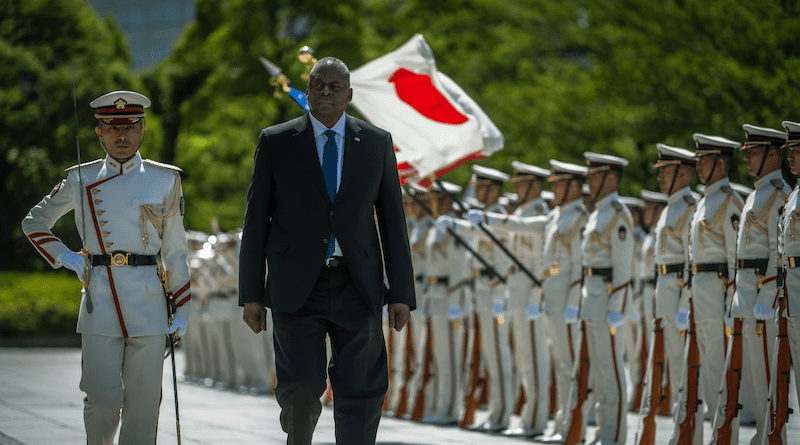US, Japanese Defense Leaders Discuss Progress On Closer Alliance
By DoD News
By Jim Garamone
U.S. and Japanese defense leaders are “operationalizing” agreements that are deepening the treaty alliance, said Secretary of Defense Lloyd J. Austin III and Japanese Defense Minister Yasukazu Hamada in Tokyo.
“This is a consequential time for our alliances,” Austin said during a news conference following today’s meeting. “We are deeply concerned by [China’s] coercive behavior and its attempts to undermine the rules-based, international order. And, meanwhile, Russia continues to wage its cruel and unprovoked war of choice against Ukraine. We appreciate Japan’s assistance to Ukraine and your leadership in opposing any attempts to change the status quo by force.”
Austin and Hamada also discussed North Korea’s continuing dangerous and destabilizing nuclear and missile programs. The secretary said the North Korean activities threaten peace and stability in the region and violate international law. “We stand with our Japanese and ROK [South Korean] allies in the face of North Korea’s continued provocations, including yesterday’s claimed space launch,” the secretary said. “The United States will take all necessary measures to ensure the security of our homeland and the defense of our allies.”
Austin specifically stated the United States’ unwavering commitment to Japan, including “extended deterrence provided by the full range of U.S. conventional and nuclear capabilities.”
Austin also met with U.S. and Japanese service members during his visit. “I’m especially grateful to have the opportunity to visit with service members from both of our countries who stand shoulder-to-shoulder to uphold our alliances and to strengthen regional peace and stability,” he said. “Our militaries are operating and training together like never before to maintain peace, deter aggression and respond to crises.”
Hamada and Austin discussed moves to strengthen cooperation between the two nations. Hamada specifically highlighted the deployment of MQ-9 Reapers to Japan, the establishment of the Marine Littoral Regiment in the country, and increased exercises between the two nations’ militaries.
The defense minister said the meeting with Austin confirms the importance of defense cooperation. He said Japan is not only becoming closer to the U.S. military, but also with South Korea, Australia, India and the Association of Southeast Asian Nations.
Austin touted the work that has already happened to strengthen U.S.-Japanese military interoperability. “We’re strengthening our information sharing through new bilateral mechanisms,” he said. “We’re working together on advanced technologies, including hypersonics, autonomous systems for teaming with fighter jets, and advanced air defense systems. And we’re increasing cooperation between our defense supply chains and building critical ties between our defense industrial bases.”
Austin strongly supported Japan’s decision to update its national security policies, including the decision to increase defense spending and acquire counter strike capabilities.
“Here’s the bottom line: The United States and Japan have made impressive progress together,” the secretary said. “And I am confident that our alliances will grow even stronger as we keep building on this momentum.”
Austin will also journey to Singapore where he’ll participate in the Shangri-la Dialogue and meet with many defense ministers from around the Indo-Pacific. He will not meet with the Chinese defense minister, who declined Austin’s request for a meeting. “The minister of defense declining to meet with me. I think that’s unfortunate,” Austin said. “But we’re going to continue to do what we are doing in this region and others, and that is to work with like-minded countries who share common values and common goals to continue to promote a free and open Indo-Pacific.”
The secretary said China should continue dialogue with the United States to prevent a crisis or incident from spiraling out of control. “As we take a look at some of the things that China is doing in the international airspace in the region and international waterways — … the provocative intercepts of our aircraft and also our allies’ aircraft — that’s very concerning, and we would hope that they would alter their actions,” he said. “I would welcome any opportunity to engage with leadership. I think defense departments should be talking to each other on a routine basis or should have open channels for communication.”

